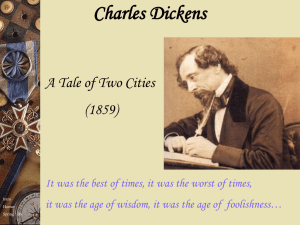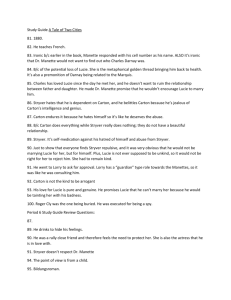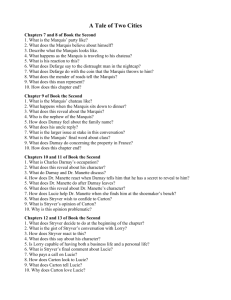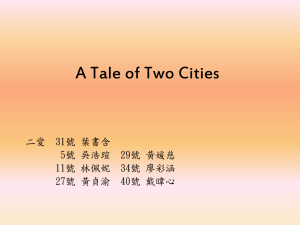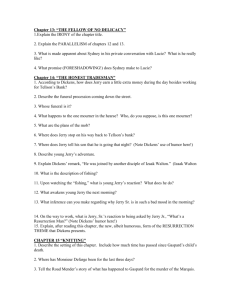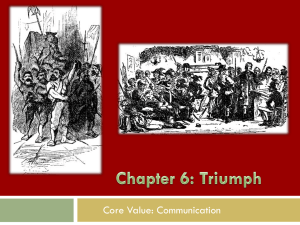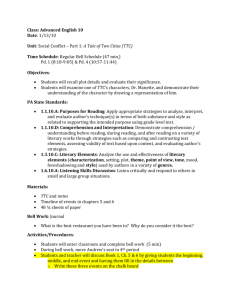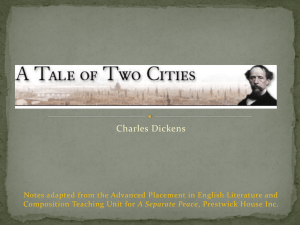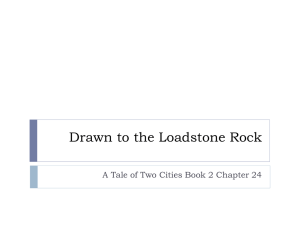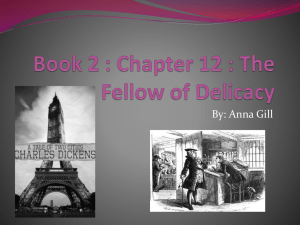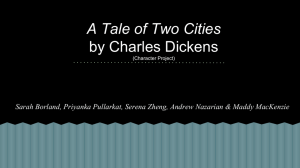A Tale of Two Cities Study Guide: Questions & Answers
advertisement
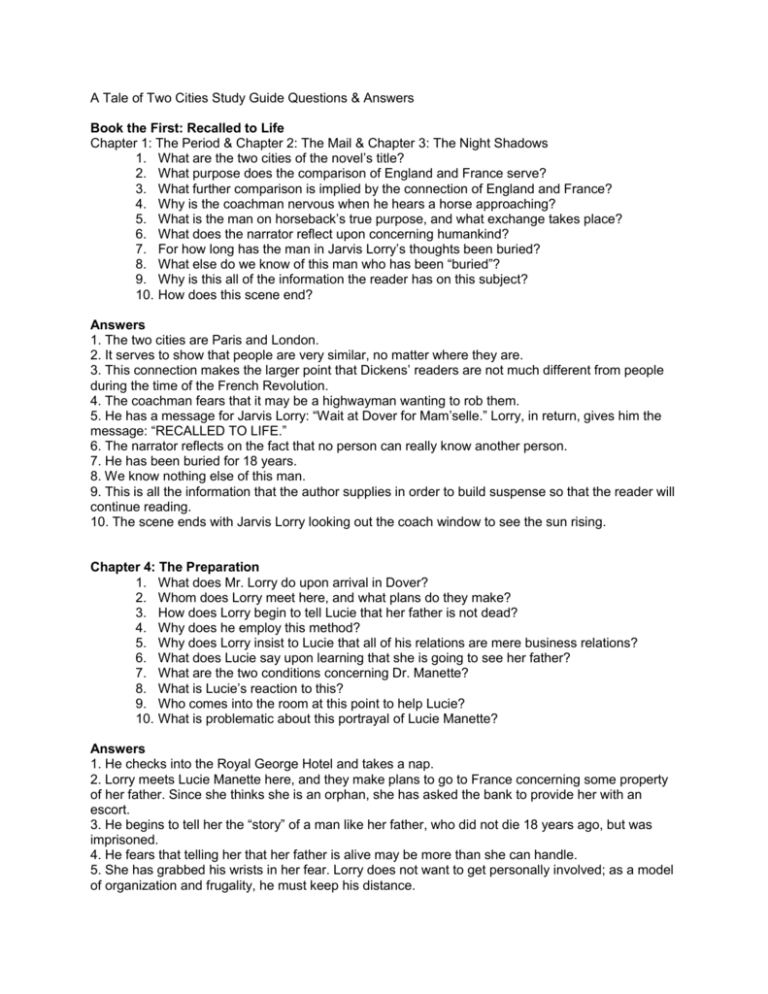
A Tale of Two Cities Study Guide Questions & Answers Book the First: Recalled to Life Chapter 1: The Period & Chapter 2: The Mail & Chapter 3: The Night Shadows 1. What are the two cities of the novel’s title? 2. What purpose does the comparison of England and France serve? 3. What further comparison is implied by the connection of England and France? 4. Why is the coachman nervous when he hears a horse approaching? 5. What is the man on horseback’s true purpose, and what exchange takes place? 6. What does the narrator reflect upon concerning humankind? 7. For how long has the man in Jarvis Lorry’s thoughts been buried? 8. What else do we know of this man who has been “buried”? 9. Why is this all of the information the reader has on this subject? 10. How does this scene end? Answers 1. The two cities are Paris and London. 2. It serves to show that people are very similar, no matter where they are. 3. This connection makes the larger point that Dickens’ readers are not much different from people during the time of the French Revolution. 4. The coachman fears that it may be a highwayman wanting to rob them. 5. He has a message for Jarvis Lorry: “Wait at Dover for Mam’selle.” Lorry, in return, gives him the message: “RECALLED TO LIFE.” 6. The narrator reflects on the fact that no person can really know another person. 7. He has been buried for 18 years. 8. We know nothing else of this man. 9. This is all the information that the author supplies in order to build suspense so that the reader will continue reading. 10. The scene ends with Jarvis Lorry looking out the coach window to see the sun rising. Chapter 4: The Preparation 1. What does Mr. Lorry do upon arrival in Dover? 2. Whom does Lorry meet here, and what plans do they make? 3. How does Lorry begin to tell Lucie that her father is not dead? 4. Why does he employ this method? 5. Why does Lorry insist to Lucie that all of his relations are mere business relations? 6. What does Lucie say upon learning that she is going to see her father? 7. What are the two conditions concerning Dr. Manette? 8. What is Lucie’s reaction to this? 9. Who comes into the room at this point to help Lucie? 10. What is problematic about this portrayal of Lucie Manette? Answers 1. He checks into the Royal George Hotel and takes a nap. 2. Lorry meets Lucie Manette here, and they make plans to go to France concerning some property of her father. Since she thinks she is an orphan, she has asked the bank to provide her with an escort. 3. He begins to tell her the “story” of a man like her father, who did not die 18 years ago, but was imprisoned. 4. He fears that telling her that her father is alive may be more than she can handle. 5. She has grabbed his wrists in her fear. Lorry does not want to get personally involved; as a model of organization and frugality, he must keep his distance. 6. She says, “I am going to see his ghost! It will be his ghost—not him!” 7. First, that he has lost his memory of any past life. Second, that he must be removed from France in secret. 8. She sits silently in her chair, unable to utter a word. 9. Her servant, Miss Pross, enters and calms Lucie. 10. Lucie is portrayed as unable to take care of herself. She will constantly be defined in terms of her reliance on others. Chapter 5: The Wine Shop 1. What is happening at the beginning of this chapter? 2. What does the man write on the wall? What does this foreshadow? 3. What kind of town is Saint Antoine? 4. Who are the proprietors of the wine-shop? 5. What is the significance of the name “Jacques”? 6. What is the impression of Madame Defarge from this chapter? 7. Why does Defarge show Dr. Manette to the “Jacques”? 8. Where is Dr. Manette being held? 9. What is Lucie’s reaction upon seeing him? 10. What is Dr. Manette doing when they enter his room? Answers 1. A cask of wine has broken open on the street of a Paris suburb. All of the townspeople are engaged in drinking the wine and staining themselves with its red color. 2. He writes “BLOOD.” This anticipates the real blood that will be spilled in the name of revolution. 3. Saint Antoine is described as a place full of “cold, dark, sickness, ignorance, and want.” 4. The proprietors of the wine-shop are Ernest and Therese Defarge. 5. The peasants adopted this name from what the nobility called them. They turned a derogatory name into one that helped give them a sense of common purpose. 6. She is “stout” and ominous; she can be seen as the polar opposite of the diffident Lucie Manette. 7. He feels that Dr. Manette is a symbol of the cruelty of the ruling class. 8. He is being held in a tiny, dark room in an apartment above the wine-shop. 9. She is scared and reaches to Mr. Lorry for comfort. 10. He is bent over a bench, making shoes. Chapter 6: The Shoemaker 1. What is Dr. Manette’s condition? 2. What does Dr. Manette say his name is? 3. What is the significance of what he says? 4. What helps Dr. Manette begin to remember his past? 5. How soon do they decide to leave France? 6. Why does Mr. Lorry refer to “business” again? 7. What is Lucie’s “strength” in this chapter? 8. What is the importance of Dr. Manette returning to the shoe he is making? 9. What does Mr. Lorry say to Dr. Manette? 10. What is the nature of Dr. Manette’s reply? What function does his reply serve regarding the plot? Answers 1. Dr. Manette is weak and feeble. He cannot remember his past; he cannot even remember his name. 2. He says “One Hundred and Five, North Tower.” 3. This is the number of his prison cell and an illustration of how his long imprisonment has stolen his identity. 4. Lucie shows that she loves him by showering him with affection. 5. They decide to leave France immediately. 6. He refers to “business” because he may be trying to deny that he is forming a personal connection with the Manettes. 7. Her strength is that her love is able to do good–for instance, helping her father remember his past. 8. This shows that he has a long way to go in recalling his past as a doctor. 9. Mr. Lorry asks Dr. Manette, “I hope you care to be recalled to life?” 10. Dr. Manette replies, “I can’t say.” This leaves the plot dangling, urging the reader on to the next installment. Book the Second: The Golden Thread Chapter 1: Five Years Later & Chapter 2: A Sight 1. How is Tellson’s Bank described at the beginning of the chapter? 2. What is the eighteenth century view of the death penalty in England? 3. Why does Jerry Cruncher call his wife “a conceited female,” and what is her reaction to this? 4. What is the significance of the striking physical resemblance between Jerry Cruncher and his son? 5. Why is there such a large crowd in the courtroom? 6. What does Jerry Cruncher ask the man who assumes that Darnay will be found guilty? 7. Why do all eyes in the courtroom turn to Lucie Manette? 8. How is Lucie Manette different from those around her in the courtroom? 9. How is this strength undermined? 10. On what suspenseful note does the chapter end? Answers 1. Tellson’s Bank is an unchanging, old-fashioned place, proud of its dirtiness and ugliness. 2. The death penalty was in great use for even minors. 3. He calls her conceited because he assumes that she thinks her prayers are worth something. She tells him that the prayers come from her heart, and that is all that they are worth. 4. This shows that young Jerry will probably end up just like his father, stuck rigidly in a low social class. 5. The crowd is large because many people wish to see a public execution. 6. He asks this man if he means “if” they find the defendant guilty. The man assures Cruncher that the jury will find him guilty. 7. All eyes turn to her because of the striking expression of fear and compassion on her face. 8. She is one of the few people in the courtroom who are able to feel pity for the prisoner. 9. Her moral strength is undermined by her physical weakness, shown by her need to cling to her father. 10. We learn that, although Lucie feels compassion for the prisoner, she is a witness against him. Chapter 3: A Disappointment 1. What does the Attorney-General say about the prisoner in his opening statements? 2. Who are the two witnesses that the Attorney-General says will incriminate Darnay? 3. How does Stryver show that these two men are not credible witnesses? 4. 5. 6. 7. 8. 9. 10. Why is Lucie Manette called to the witness stand? What did Darnay tell Lucie on the ship five years ago? What leads to Darnay’s acquittal? What problem concerning Dickens’ use of plot does this reveal? What happens to Lucie Manette, once again, in this chapter? What is the final line of this chapter? What are the implications of this line? Answers 1. He says that the prisoner has been engaged in secret business between France and England for at least the past five years. 2. One is described as a patriot who has been able to figure out what the prisoner has been doing; his name is John Barsad. The other is the prisoner’s former servant, Roger Cly. 3. He shows that Barsad has been in debtor’s prison and that he owes the prisoner money. Stryver proves that Cly is a thief who has been friends with Barsad for many years. 4. She is called to the witness stand because she talked to Darnay on a boat ride from France to England five years before. 5. He told her that he was conducting business of a sensitive nature and that he was traveling under an assumed name. 6. A man who looks exactly like Darnay proves to the jury that it is very easy to mistake one person for another. 7. This plot twist is too coincidental to be believable. 8. Her physical strength fails her when she feels strong emotions. 9. The crowd is described as “dispersing in search of other carrion.” 10. This line implies that a crowd can easily develop a lust for violence that has little to do with justice. Chapter 4: Congratulatory & Chapter 5: The Jackal 1. What is happening at the beginning of Chapter 4? 2. How does Darnay greet Lucie? 3. How does Dr. Manette look at Darnay? What does this mean? 4. What does their conversation reveal as the difference between Lorry and Carton? 5. What happens while Carton and Darnay are dining? 6. Why does Carton say that he hates Darnay? 7. Why do Stryver and Carton meet? 8. What does Carton say about Lucie? 9. What else does Carton complain about? 10. What does the final paragraph say about Sydney Carton? Answers 1. Dr. Manette, Lucie, Lorry, and Stryver are congratulating Darnay on his acquittal. 2. He greets Lucie by kissing her hand. 3. He looks at Darnay with “distrust,” “dislike,” and “fear.” 4. Lorry is a man of ambition who believes in “business,” while Carton, even though he was ability, lacks the desire to do anything. 5. Carton gets drunk and calls himself “a disappointed drugde.” 6. He says that he hates Darnay because Darnay reflects everything good that Carton could have been. 7. They meet because Carton does Stryver’s legal paperwork. 8. Carton calls Lucie “a gold-haired doll.” 9. Carton complains more about his life and that he is always behind everybody else. 10. It says Carton has given up all hope of making anything of his life. Chapter 6: Hundreds of People 1. Where is Mr. Lorry going at the beginning of this chapter? 2. What is the tone of this chapter? 3. Is Miss Pross’ claim that “hundreds of people” visit the house accurate? 4. What has Miss Pross’ brother done to her? 5. What has Dr. Manette kept as a reminder of his 18 years in prison? 6. Who else comes to the Manettes’ house on this Sunday? 7. What is odd about Dr. Manette’s house? 8. Of what is this symbolic? 9. What happens when a storm approaches? 10. What is foreshadowed by the storm? Answers 1. He is on his way to dine with Lucie and Dr. Manette, with whom he has become friends. 2. This chapter starts out with a tone of quiet normality but conveys an ominous sense that this normality is about to be shattered. 3. No. In fact, only three visitors show up on this day. 4. He has stolen everything that she owns, yet she still holds him in high esteem. 5. He has kept his shoemaker’s bench and tools. 6. Charles Darnay and Sydney Carton are the other visitors. 7. The house has an acoustical property that allows distant footsteps to be heard as if they were up close. 8. These distant footsteps are symbolic of that danger that is coming to the people in the house. 9. The sound of echoing footsteps grows louder as people hurry for shelter from the storm. 10. The storm foreshadows that something ominous is about to happen. Chapter 7: Monseigneur in Town & Chapter 8: Monseigneur in the Country 1. What is the Marquis’ party like? 2. What does the Marquis believe about himself? 3. Describe what the Marquis looks like. 4. What happens as the Marquis is traveling to his chateau? 5. What is his reaction to this? 6. What does Defarge say to the distraught man in the nightcap? 7. What does Defarge do with the coin that the Marquis throws to him? 8. What does the mender of roads tell the Marquis? 9. What does this man represent? 10. How does this chapter end? Answers 1. It is incredibly decadent, full of morally corrupt people who are only concerned with how they look. 2. He believes that “the earth and the fullness thereof are mine.” 3. He is 60 years old, with a cruel “face like a fine mask.” 4. His carriage runs over and kills a small child. 5. He blames the peasants and is so indifferent that he cares more about his horses. 6. He tells the man that the child is better off dead because it would have been impossible for the child to have a happy life. 7. He throws the coin at the carriage as it is driving away. 8. He tells the Marquis that a man was riding on the outside of the carriage. 9. He represents the fact that the nobility has no idea that the peasants have any power. 10. The chapter ends with the Marquis awaiting the arrival of “Charles…from England.” Chapter 9: The Gorgon’s Head 1. What is the Marquis’ chateau like? 2. What happens when the Marquis sits down to dinner? 3. What does this reveal about the Marquis? 4. Who is the nephew of the Marquis? 5. How does Darnay feel about the family name? 6. What does his uncle reply? 7. What is the larger issue at stake in this conversation? 8. What is the Marquis’ final word about class? 9. What does Darnay do concerning the property in France? 10. How does this chapter end? Answers 1. His chateau is described as silent and made of stone. 2. He thinks that he hears somebody outside but quickly forgets about it. 3. It reveals that he thinks he is protected from any harm because of his class. 4. Charles Darnay is the Marquis’ nephew. 5. Darnay feels that the family name is feared and detested throughout France. 6. He tells Darnay: “Detestation of the high is the involuntary homage of the low.” 7. Darnay and the Marquis are debating the whole idea of class structure. 8. He feels that it is “Better to be a rational creature…and accept your natural destiny.” 9. He renounces that property, and he renounces France, deciding that he wants to settle in England for good. 10. The chapter ends with the Marquis murdered in his bed. Chapter 10: Two Promises & Chapter 11: A Companion Picture 1. What is Charles Darnay’s occupation? 2. What does this reveal about his character? 3. What do Darnay and Dr. Mannette discuss? 4. How does Dr. Manette react when Darnay tells him that he has a secret to reveal to him? 5. What does Dr. Mannette do after Darney leaves? 6. What does this reveal about Dr. Manette’s character? 7. How does Lucie help Dr. Manette when she finds him at the shoemaker’s bench? 8. What does Stryver wish to confide to Carton? 9. What is Stryver’s opinion of Carton? 10. Why is this opinion problematic? Answers 1. He is a tutor of French language and literature. 2. This shows that he is industrious and that he has not forgotten his past in France. 3. They discuss Darnay’s intention to marry Lucie. 4. He tells Darnay to wait until the morning of the wedding to reveal his secret. 5. He returns to making shoes. 6. It shows that he cannot forget his past, either; his way of dealing with this past is by returning to it. 7. She takes his hand and walks with him for a long while. 8. He tells Carton that he intends to marry Lucie. 9. Stryver has a low opinion of Carton, telling him that he lacks social grace and is “an insensible dog.” 10. It reveals Stryver as a hypocrite since it is Carton who does all of Stryver’s legal work. Chapter 12: The Fellow of Delicacy & Chapter 13: The Fellow of No Delicacy 1. What does Stryver decide to do at the beginning of the chapter? 2. What is the gist of Styver’s conversation with Lorry? 3. How does Stryver react to this? 4. What does this say about his character? 5. Is Lorry capable of having both a business life and a personal life? 6. What is Stryver’s final comment about Lucie? 7. Who pays a call on Lucie? 8. How does Carton look to Lucie? 9. What does Carton tell Lucie? 10. Why does Carton love Lucie? Answers 1. He decides to tell Lucie of his intentions so that she may know she is going to be happy. 2. Lorry tells Stryver that he should not ask Lucie to marry him. 3. He proclaims that Lucie must be “a mincing fool” if she will not marry him. 4. It shows that he is very arrogant and bitter. 5. Yes, he finally is. He achieves this by making a clear distinction between business and friendship. 6. He says that “you cannot control..the giddinesses of empty-headed girls.” 7. Sydney Carton pays a call of Lucie. 8. He looks ill and she asks what she can do to help him. 9. He tells her that he loves her and that he is willing to die for her. 10. From the evidence given, it must be because of her “sweet compassion.” Chapter 14: The Honest Tradesman 1. What passes by Tellson’s Bank? 2. What is the crowd shouting? 3. What does the crowd do after the body is put in the ground? 4. Mr. Cruncher takes what tools with him when he goes out later that night? 5. Why does young Jerry follow his father? What does he find out? 6. What does Mrs. Cruncher think of her husband’s “occupation”? 7. How does Mr. Cruncher view his “occupation”? 8. Why does young Jerry ask his father what a resurrection-man is? 9. What is comedic about his chapter? 10. Whose body could be inferred to have been dug up? Answers 1. A funeral procession, followed by a large mob. 2. They are shouting “Spies! Pull’em out!” 3. They proceed to go on a rampage of violence and looting until a rumor spreads that the guard is coming. 4. He takes a crowbar, a sack, and some rope and chain. 5. He is curious as to his father’s “business.” He finds his father digging up a grave. 6. She thinks it is a “dreadful business.” 7. He calls himself “an honest tradesman.” 8. It is young Jerry’s way of letting his father know that he approves of the grave-robbing business. 9. Mr. Cruncher actually believes that grave-robbing is an honest trade; thus he fits the Victorian ideal of having a “labor.” 10. We can infer that is the Roger Cly’s body. Chapter 15: Knitting 1. Why does Defarge bring the mender of the roads to the wine shop? 2. Who presents the petition to the King and what was the result? 3. What does it mean to be “registered?” 4. How is this register kept secret? 5. Where do the Defarges take the mender of roads? 6. How does the mender of roads act? 7. Why is Ernest Defarge happy with the way the mender of the roads acts? 8. What does Madame Defarge say about dolls and birds? 9. To whom is she referring? 10. How does this scene end? Answers 1. He brings the mender of roads to the wine-shop, so that the mender of roads can hear the whole story of the man in the nightcap. 2. Ernest Defarge presented the petition to the King; it was ignored and the man was executed. 3. A person who is registered is marked to be killed when the revolution arrives. 4. Madame Defarge secretly knits the register in code. 5. They take him to see the King and Queen pass by. 6. He joins in the applause for the King and Queen. 7. He is happy because he feels that this adoration will lull the nobility into a false sense of security, thus allowing the revolution to begin sooner. 8. She tells the mender of roads that he would naturally attack the finest birds and dolls if it were to his advantage. 9. “Birds” and “dolls” represent the French ruling class. 10. Madame Defarge sends the mender of roads home to think about what she has told him. Chapter 16: Still Knitting 1. Why do the Defarges go to Paris? 2. What do they learn there? 3. What is distinctive about John Barsard? 4. Why does Madame Defarge put a rose in her hat? 5. What is Madame Defarge doing while she speaks with Barsard? 6. What does Barsard tell the Defarges about the Manettes? 7. How does Ernest Defarge react to this? 8. What would happen if Darnay and the Manettes were to come to France? 9. How does Madame Defarge feel about this? 10. What are Madame Defarge and the other women doing as the chapter ends? Answer 1. They go to Paris to meet “Jacques of the police.” 2. They learn that there is a spy in St. Antoine, by the name of John Barsard. 3. He has a crooked nose. 4. It is a signal to the Jacques that there is a suspicious stranger amongst them. 5. She is knitting his name, thus condemning him to death. 6. 7. 8. 9. 10. He tells them that Lucie Manette is going to marry the nephew of the Marquis. He hopes that the Manettes stay in England. They would be killed as nobility when the revolution arrived. She is indifferent, saying only that they are registered. They are “knitting, knitting, counting dropping heads.” Chapter 17: One Night & Chapter 18: Nine Days 1. Of what do Lucie and her father assure each other on the night before her wedding? 2. What does Dr. Manette speak of for the first time? 3. What does Lucie pray for that night? 4. How does Dr. Manette react to hearing Darnay’s secret? 5. Who is present at the wedding? 6. What does Dr. Manette say to Darnay after the wedding? 7. What does this reveal about Lucie’s character? 8. What does Dr. Manette do after Lucie and Charles leave? 9. How does Lorry react to this? What does he try to do? 10. How long does this go on? Answers 1. They assure each other that Lucie’s marriage will only make them closer. 2. He speaks of his 18 years in prison. 3. She prays that she may be able to stay as devoted to her father as she now is. 4. He hides his distress well, but Lorry notices that something is wrong. 5. Besides Lucie, Charles, and Dr. Manette, only Lorry and Miss Pross are at the wedding. 6. He says, “Take her, Charles! She is yours!” 7. It reveals that her character is defined according to her relationship to the men around her. 8. He returns to “making shoes.” 9. He tries to talk to Dr. Manette, but soon realizes that it is useless. He can do nothing except keep watch over Dr. Mnette. 10. It goes on for nine days. Chapter 19: An Opinion & Chapter 20: A Plea 1. What happens after Dr. Manette’s ninth day of making shoes? 2. How does Lorry approach Dr. Manette concerning his relapse? 3. What does Dr. Manette say about the cause of this relapse? 4. How does Lorry convince Manette to allow him to destroy the bench? 5. What is the symbolic nature of smashing the bench? 6. Who visits the couple upon their return from their honeymoon? 7. What do Carton and Darnay talk about? 8. What function does this serve? 9. What does Lucie ask her husband to do? 10. Why does she ask this of him? Answers 1. He regains his composure and stops making shoes. 2. He tells Manette he wants to speak of “a curious case” that he knows of. 3. He says it is caused by an apprehension that the “subject” is unable to talk about. 4. He tells Manette that it should be done “for his daughter’s sake.” 5. It is symbolic of Dr. Manette’s attempt to put the past behind him. 6. Sydney Carton is their first visitor. 7. Carton and Darnay speak of the trial and the meal they shared afterwards. 8. It serves to clear the air concerning past events. 9. She asks him to be generous and kind to Carton and to not speak ill of him when he is not present. 10. She says that she is aware of some deep wounds in Carton’s soul that he keeps hidden from everybody else. Chapter 21: Echoing Footsteps 1. How many children does Lucie have? What are their fates? 2. What does the death of the second child signify? 3. What else happens as six years pass? 4. What news does Mr. Lorry bring that marks the beginning of the end of normalcy? 5. What happens in Paris? 6. What does Ernest Defarge do in the midst of the storming of the Bastille? 7. Why is this important? 8. What does Madame Defarge do to the governor’s dead body? 9. What does the final paragraph of this chapter have to say about Lucie? 10. To what event does the final paragraph refer? Answers 1. She has two children. The daughter lives and flourishes while her son dies at a young age. 2. His death shows that tragedy is always close by. 3. The six years pass calmly, and Lucie and her family build a quiet, uneventful domestic life. 4. Lorry tells them that there has been a run of confidence on Tellson’s because of the instability in France. 5. The peasants storm the Bastille. 6. He makes a guard take him to “One Hundred and Five, North Tower.” 7. It reveals that Dr. Manette’s imprisonment has deeply affected him. 8. She cuts off his head. 9. It states a hope that the events in France do not affect her quiet life in England. 10. It is refers to the wine that was spilled in St. Antoine many years ago. Chapter 22: The Sea Still Rises & Chapter 23: Fire Rises 1. How does Chapter 22 open? 2. What does Ernest Defarge tell the crowd at the wine-shop? 3. What is the result of this news? 4. How are the women who join Madame Defarge described? 5. What has Foulon said to the peasants before? 6. What is his fate? 7. Who joins him in this fate? 8. How could this relate to Charles Darnay? 9. How does Madame Defarge react towards Foulon? 10. What do the peasants do next? Answers 1. Madame Defarge and The Vengeance are sitting in the wine shop, kitting. 2. He tells them that Foulon has been captured. 3. A mob forms and proceeds to where Foulon is being imprisoned. 4. They are described as “mad” women who leave their children behind. 5. He has said of the starving peasants that they might eat grass. 6. His head winds up on a pike, with his mouth full of grass. 7. His son-in-law soon has his head on a pike, next to him. 8. It shows what may happen to Darnay, nephew of Marquis, if her were to come to France. 9. She slowly kills him “as a cat might have done to a mouse.” 10. They burn down the Marquis’ chateau. Chapter 24: Drawn to the Loadstone Rock 1. How many years have passed between chapters? 2. Why does Lorry decide to go to France? 3. Whom does he take with him? 4. What has happened to the French nobility? 5. What is Mr. Stryver’s opinion of the situation in France? 6. From whom does Charles Darnay receive a letter? 7. What decision does this letter lead Darnay to make? 8. Whom does he tell of his plans? 9. Why is this decision unbelievable? 10. What is the main function of this chapter? Answers 1. Three years have passed. 2. He is going to help out at the chaotic Paris branch of Tellson’s Bank. 3. He takes only Jerry Cruncher with him. 4. They are exiled in England, planning how to get their country back. 5. He thinks that the peasants should all be killed. 6. He receives a letter from Gabelle, the Marquis’ functionary in France. Gabelle is now in prison. 7. Darnay decides to go to France to help Gabelle. 8. He keeps his plan secret, telling no one. 9. Darnay would have to be aware of the incredible danger he was putting himself in. 10. It serves to set up the action that will unfold in the novel’s final section.
